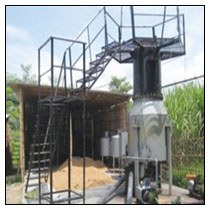
Alstom, as part of its commitment towards social
responsibility, announced the launch of a project
'Dry Gasifier' in India in collaboration with USA based
Husk Power Systems—one of the world's lowest cost
providers of biomass based renewable energy equipment.
Launched under the aegis of Alstom Foundation, the grant
will enable HPS to become truly scalable in rural
electrification business.
A part of the grant from Alstom Foundation will be used
in finalizing a Dry Gasification process for low-cost
manufacturing and retro-fitting these dry gasifiers at the
existing 65 power plant sites of HPS in Bihar. Another part
of grant will be used for developing a semi-automated
machine for volume production of incense sticks and
deployment of such systems at existing power plant sites.
Part of the funding will also go into providing vocational
programmes and training for women for a consistent and
high quality manufacturing.
The immediate environmental impact of a successful dry
gasification system will result in dramatic reduction in
water uses by over 80 per cent and will also result in
reduction of operational expense. The cost benefit is then
directly translated to customers who get electricity from
HPS power plants. The project will also create employment
opportunities thereby increasing the local economic
activities fueled by renewable energy. This also enables HPS
to scale faster and hence light more off-grid villages, a
statement by Alstom observed.
HPS & Rural Electrification: Around 125,000 Indian
villages still lack access to reliable power. The Indian
government has designated 18,000 of these villages as
economically impossible to reach via conventional means. It is
in this context that decentralized power generation methods
like biomass come into play. Husk Power Systems is working
towards rural electrification of India. The company lighted the
first village from its first 100 per cent biomass based power
plant in August 2007. Today, it operates 90 decentralized minipower
plants (40 KVA each) that powers 36,000 households in
325 villages and impact lives of 200,000 people in rural parts of
India. So far HPS has successfully reduced carbon footprint by
15,000 tonnes of CO2 which would have been emitted by
burning 2.2 million litres of kerosene and approximately
900,000 litres of diesel annually.